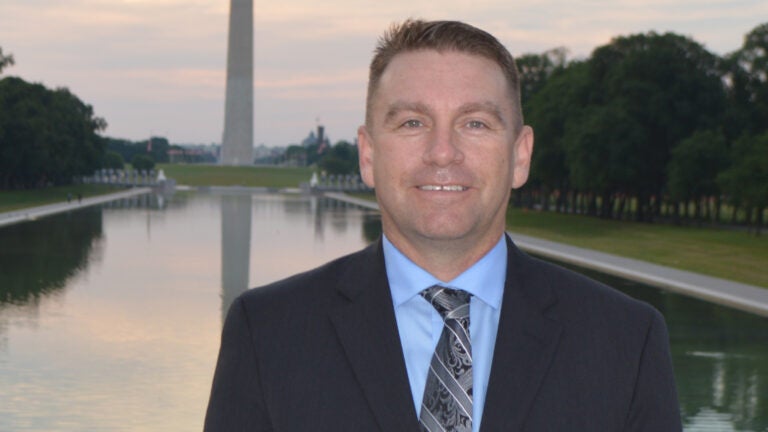
Eric Chastain | PHOTO COURTESY OF ERIC CHASTAIN
From U.S. Soldier to USC Social Worker
Army Sgt. Maj. Eric Chastain MSW ’15 helps military members and their families with the painful legacy of war.
One after the other, U.S. Army Battalion Sgt. Maj. Eric Chastain watched 22 of his friends die. It was almost normal: Loss of life is expected in wartime. Chastain had seen it all, and more, during his three deployments in Iraq and his years fighting terrorism overseas.
He was tough on the inside, too: He had joined the Army and put his college education on hold to support his mom, sister and brother when his dad was incarcerated.
But when young Pvt. Justin Garcia from his battalion was killed by a roadside bomb in downtown Baghdad, Iraq, in 2006, everything changed for Chastain. It wasn’t just that the world lost Garcia’s potential—or that Chastain lost a brother in arms.
“When I met his body in Dover, Delaware, and escorted him home, it was something I was unprepared for as a soldier,” Chastain remembers. Garcia had a wife with a baby on the way, and loving relatives. Meeting them and seeing their grief showed Chastain that for military families, a huge gulf in care needed to be bridged. Chastain wanted to do something about it. He had to.
So the soldier transformed into a social worker.
I think there’s probably a misperception that soldiers are [the only ones] damaged coming out of war.
Still in the Army, Chastain earned his psychology degree from a liberal arts college in Washington state before pursuing a Master of Public Administration from the University of Texas at El Paso, where he worked as an on-call counselor for Families of the Fallen, an organization that helps families struggling with family members in the military. Then he “virtually” returned to Southern California (he grew up in the small Inland Empire town of Beaumont) for graduate work through the USC Suzanne Dworak-Peck School of Social Work. He earned his Master of Social Work through the school’s online degree program, specializing in military social work, in 2015.
Today he serves on the board of directors of the Washington branch of the National Alliance on Mental Illness. He has already used his unique perspective and experience to develop a suicide support group for military families in the state.
“I think there’s probably a misperception that soldiers are [the only ones] damaged coming out of war,” Chastain says. “People who have the hardest trouble are the families who are not trained to be resilient with these kinds of things, who are not trained to overcome physical disabilities.”
The USC Suzanne Dworak-Peck School of Social Work’s military social work program teaches students about military culture and the needs of military members, veterans and their families. It also trains graduates to help military members who are returning from service—assisting them with job and health resources. Students learn to work with local agencies to identify and serve military members, veterans and families in their communities. It is the only program of its kind offered in the U.S. by a civilian research university.
